2020学年人教版高中英语必修三Unit1 单词导学案
2020年人教版高中英语必修三unit1reading 说课稿
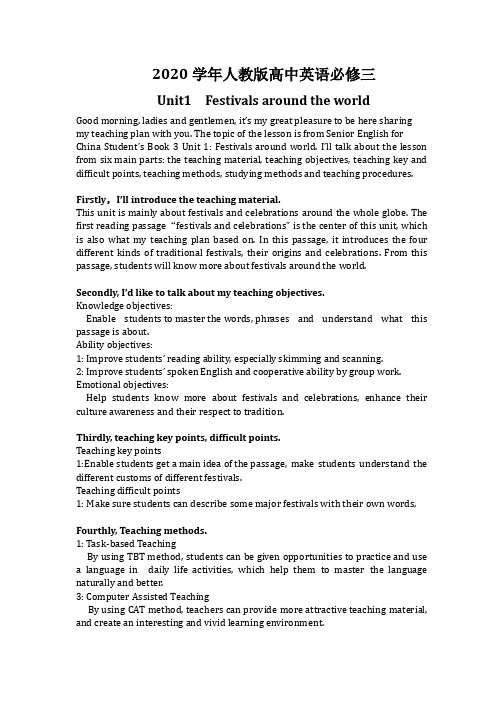
2020学年人教版高中英语必修三Unit1 Festivals around the worldGood morning, ladies and gentlemen, it’s my great pleasure to be here sharing my teaching plan with you. The topic of the lesson is from Senior English for China Student’s Book 3 Unit 1: Festivals around world. I’ll talk about the lesson from six main parts: the teaching material, teaching objectives, teaching key and difficult points, teaching methods, studying methods and teaching procedures. Firstly,I’ll introduce the teaching material.This unit is mainly about festivals and celebrations around the whole globe. The first reading passage“festivals and celebrations” is the center of this unit, which is also what my teaching plan based on. In this passage, it introduces the four different kinds of traditional festivals, their origins and celebrations. From this passage, students will know more about festivals around the world. Secondly, I’d like to talk about my teaching objectives.Knowledge objectives:Enable students to master the words, phrases and understand what this passage is about.Ability objectives:1: Improve students’ reading ability, especially skimming and scanning.2: Improve students’ spoken English and cooperative ability by group work. Emotional objectives:Help students know more about festivals and celebrations, enhance their culture awareness and their respect to tradition.Thirdly, teaching key points, difficult points.Teaching key points1:Enable students get a main idea of the passage, make students understand the different customs of different festivals.Teaching difficult points1: Make sure students can describe some major festivals with their own words, Fourthly, Teaching methods.1: Task-based TeachingBy using TBT method, students can be given opportunities to practice and use a language in daily life activities, which help them to master the language naturally and better.3: Computer Assisted TeachingBy using CAT method, teachers can provide more attractive teaching material, and create an interesting and vivid learning environment.Fifthly, studying methods.1: Task-based learning.2: Cooperative learningSixthly, Teaching procedures.1: Lead-inShow students a short video some traditional festivals’ celebrations. After watching that, ask students questions like “have you ever had these festivals?” “what do you do at these festivals?” “how do you know about these festivals?”Justification: in the beginning of the class, I want to use online video to create a lively environment in which students can get involved in more quickly, and also activate students interest and background knowledge of the topic.2: While-reading.Task 1 SkimmingDivide students into 8 groups, give them 3 minutes to glance over the title and each paragraph, then try to discuss and sum up the main idea of each and the theme of the whole passage.Justification: practice students’ ability of reading for the general idea, moreover, by group disc ussion, turn passive study to active study, and enhance students’ spoken English and the consciousness of cooperative learning.Task 2 ScanningGive students 8 minutes to read the passage carefully, then ask them questions like:1, what festivals are held to honour the dead and ancestors?2, who is honoured in India in October 2?3, what do European people do to celebrate harvest?4, what festivals are celebrated in Spring?Justification: practice students’ ability of reading for specific information. And also, by answering those questions students can have a better understanding of festivals around the world.3: Post-reading.Divide students into 8 groups, ask students to find out and discuss all the festivals and celebrations mentioned in the passage. After that, each group sends a representative to describe two festivals in front of the whole class. Justification: deepen students’ knowledge of today’s class. Make sure students can talk about festivals and celebrations by using their own words. Encourage students to express themselves in the face of people and to cooperate with others.4: Consolidation.Ask students to review the passage very quickly then complete the exercise below.Justification: review and consolidate the knowledge we’ve just learnt.5: Homework.Write an essay to introduce a festival and how it is celebrated.Justification: this activity does not only strengthen students’ understanding of different kinds of festivals and celebrations, but also improve students’ interculture awareness.。
2020年新人教版必修三《Unit 3 Diverse Cultures》单元教案(附导学案)1
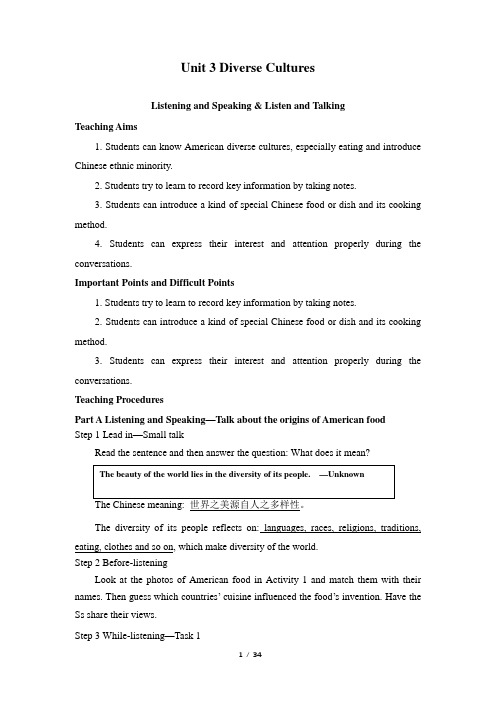
Unit 3 Diverse CulturesListening and Speaking & Listen and TalkingTeaching Aims1. Students can know American diverse cultures, especially eating and introduce Chinese ethnic minority.2. Students try to learn to record key information by taking notes.3. Students can introduce a kind of special Chinese food or dish and its cooking method.4. Students can express their interest and attention properly during the conversations.Important Points and Difficult Points1. Students try to learn to record key information by taking notes.2. Students can introduce a kind of special Chinese food or dish and its cooking method.3. Students can express their interest and attention properly during the conversations.Teaching ProceduresPart A Listening and Speaking—Talk about the origins of American foodStep 1 Lead in—Small talkRead the sentence and then answer the question: What does it mean?The Chinese meaning: 世界之美源自人之多样性。
2020年新人教版必修三《Unit 1 Festivals and Celebrations》单元教案(附导学案)1

Unit 1 Festivals and CelebrationsListening and speaking & Listening and talking【教材分析】本板块的活动主题是“谈论节日活动”(Talk about festival activities),主要是从贴近学生日常生活的角度来切入“节日”主题。
学生会听到发生在三个国家不同节日场景下的简短对话,对话中的人们正在参与或将要亲历不同的庆祝活动。
随着全球化的进程加速,国际交流日益频繁,无论是国人走出国门还是外国友人访问中国,都已成为司空见惯的事情。
因此,该板块所选取的三个典型节日场景都是属于跨文化交际语境,不仅每组对话中的人物来自不同的文化背景,对话者的身份和关系也不尽相同。
【教学目标】1. Master the new words related to holiday: lantern, carnival, costume, dress (sb) up, march, congratulation, congratulate, riddle, ceremony, samba, make-up, after all.2. To understand the origin of major world festivals and the activities held to celebrate them and the significance of these activities;3. Improve listening comprehension and oral expression of the topic by listening and talking about traditional festivals around the world;4. Improve students’ understanding of the topic by watching pictures and videos about different traditional festivals around the world;5. Review the common assimilation phenomenon in English phonetics, distinguish the assimilated phonemes in the natural language flow, and consciously use the assimilation skill in oral expression.【教学重难点】Importance:1. Guide students to pay attention to the attitude of the speaker in the process of listening, and identify the relationship between the characters;2. Inspire students to use topic words to describe the festival activities based on their background knowledge.Difficulties:In the process of listening to the correct understanding of the speaker’s attitude, accurately identify the relationship between the characters.【课前准备】1. To understand the origin of traditional festivals in the world, the celebration activities (customs) of these festivals and the meaning of these activities;2. Talk about holiday celebrations;3. Preview: understand the new words according to the context.【教学过程】Step 1 Lead-inTeachers talk about the world’s traditional festivals, such as the Lantern Festival in China, adults’ day in foreign countries, carnivals and so on.Step 2 Watching and talkingActivity 11. Teacher lets Ss look at some pictures about festival activities. During talking about these activities, teacher can add some background knowledge about festivals.Questions:①What festivals do the pictures show us?②In which country do you think people celebrate each festival?③How do people celebrate each festival?2. Ask sb to choose some words or phrases from the box to celebrate eachfestival.3. Teacher can show students how to use these word blocks and learn to describeholiday activities in groups. For example:On the Coming-of-Age Day, young girls in Japan would wear traditional costumes.One of the most important activities during the Lantern Festival is to guess riddles.During the Rio Carnival, you can watch wonderful samba dances.4. The teacher asks students to report the results of the group lecture. Ask thesequestions:①What do people do to celebrate the Chinese Lantern festival?②Who will celebrate Coming-of-Age Day? What do they do to celebrate it?③What do you expect to see if you go to the Rio Carnival?5. Learn some words and phrases in the box.Step 3 ListeningActivity 21. Teacher asks sb to read “Listen for relationships”, In pairs, discuss how to identify relationships between people based on their tone and content. The teacher can provide the following questions to inspire students to discuss.①What does a tour guide usually say to a tour group? What expressions arefrequently used?②What questions does an interviewer usually ask during an interview?③What would a reporter say or do if he/she wants to interview a tourist?④How do friends usually talk?2. Some group representatives are invited to communicate and speak in class.3. Teacher plays the listening tape for students to listen to and write the order of the conversations next to the names of the festivals.4. Play the tape again, students match each conversation with the relationship between the speakers.5. Check the answers with class.Activities 3-41. Teacher asks students to look at the tasks and requirements of activity 3. Then read the main ideas of the three dialogues. (Guide the students to guess and fill in the words according to the context. Let the students analyze the English syntactic structure based on the meaning of the sentence and make reasonable inferences.)2. Teacher plays the tape for the second time. After listening to the tape, students discuss the answers in pairs. Then the class communicates and checks the answers.3. Teacher lets students listen to the tape for the third time (Before the teacher plays the recording for the third time, the teacher should prepare the students to takenotes and remind them to catch key words, especially phrasal verbs.).Step 4 SpeakingActivity 51. Lead the dialogue by asking questions. Let students understand how to discuss their favorite festivals and give their reasons.E.g.,Conversation 1T: Which of the three festivals do you like best?S1: I think the Coming-of-Age Day is the most interesting.T: Why is it your favourite?S1: Because I like to see women dressed up in their colorful traditional kimonos.Conversation 2T: Which of the three festivals attracts you most?S2: The Chinese Lantern Festival.T: I suppose you like yuanxiao, the sweet dumplings.S2: Not only that. I especially like guessing riddles and I’m good at it.2. Follow the example of the conversation in activity 5 and work in pairs to discuss your favorite holiday and explain why. After the discussion, the teacher asks some groups to show the dialogue.Step 5 ActingOne student plays the role of a journalist. The other three students play the roles of the characters in the listening dialogue. They are the Japanese girl attending the coming-of-age ceremony, the girl attending the Rio carnival, and the tourist visiting China. The following questions can be used in the interview:①What is the purpose of this festival?②How do you usually celebrate this festival?③What do you like best about this festival?Step 6 Pronunciation1. Help students recognize speech assimilation.(1)Teacher plays the recording of activity 1 and asks the students to pay attention to the pronunciation changes of bold letters while listening.(2)Teacher organizes students to carry out activities in pairs: the teacher plays the recording, one person in the group reads after the words and phrases in activity 1, the other person compares the pronunciation of the recording with that of his partner carefully, and points out the pronunciation problem of his/her partner if there is any difference. Then switch roles, listen to the tape again and complete the same task.2. Let students imitate and read.(1)Teacher guides students to understand the requirements of activity 2. Before listening to the tape, the teacher asks the question for students to think: “How does your pronunciation change while reading the sentences?”(2)Teacher plays the tape for the first time. The students read after the sentences in activity 2.(3)Teacher plays the tape for the second time, the students repeat the sentences again, and then discuss with their partners the differences between the pronunciation of the bold consonants in words and the pronunciation in sentences, and describe the phonetic assimilation in the flow.(4)Teacher asks different students to read the six sentences of activity 2 and report the result of the discussion on phonetic assimilation. The teacher supplements and corrects the students’conclusion, explains it appropriately, and writes the assimilation pronunciation in these sentences on the blackboard or presents it to the students through the courseware.Step 7 Listening and TalkingActivity 61. Learn the new words about the festivals.2. Look at the pictures and predict what festival Song Lin and Max are going to talk about.3. Listen and answer the questions.①What festival is Max talking about?②What did Max’s mother cook?③What did Max do during the festival?④What did Max and his family do during and after the dinner?⑤What was the best part of the festival?4. Listen again and check the answers with class.Answers:①Christmas experiences.②Roast turkey, mashed potatoes and Christmas pudding, …③He helped decorate the Christmas tree and put presents under it, then helped his mum prepare for the family dinner.④During dinner they shared stories and told jokes, afterwards they played games, opened their presents.⑤The best part was opening their presents on Christmas morning.5. Listen again and tick the phrases that Max or Song Lin uses. Then check the answers with class.6. Have a conversation with the help of these questions:①What is the recent festival you have had?②How did you celebrate it?③How do you feel about the festival? Why?Step 8 Homework1)Read the passage again and understand the food culture from a cross-cultural perspective.2)Remember the new words and learn the usages of them.【教学反思】1、通过本节内容学习,学生能否理解发生在三个国家不同节日场景下的简短对话,对话中的人们正在参与或将要亲历不同的庆祝活动;2、通过本节内容学习,学生能否辨别对话中人物之间的关系;3、通过本节内容学习,学生能否掌握听力训练中的听力策略。
新人教版高中英语Unit1Thefreshmanchallenge预习导学案
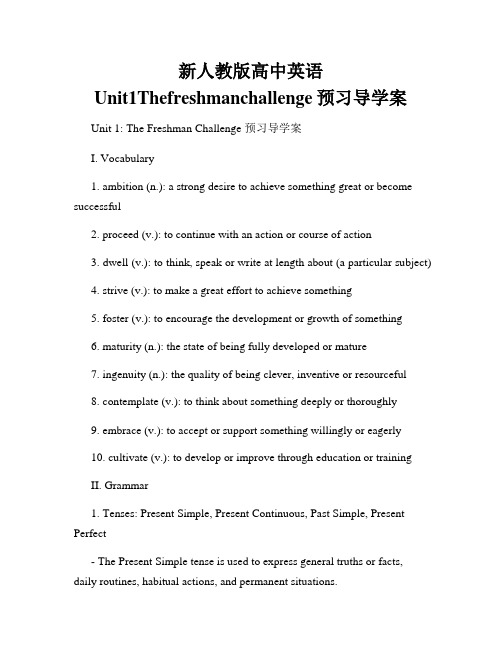
新人教版高中英语Unit1Thefreshmanchallenge预习导学案Unit 1: The Freshman Challenge 预习导学案I. Vocabulary1. ambition (n.): a strong desire to achieve something great or become successful2. proceed (v.): to continue with an action or course of action3. dwell (v.): to think, speak or write at length about (a particular subject)4. strive (v.): to make a great effort to achieve something5. foster (v.): to encourage the development or growth of something6. maturity (n.): the state of being fully developed or mature7. ingenuity (n.): the quality of being clever, inventive or resourceful8. contemplate (v.): to think about something deeply or thoroughly9. embrace (v.): to accept or support something willingly or eagerly10. cultivate (v.): to develop or improve through education or trainingII. Grammar1. Tenses: Present Simple, Present Continuous, Past Simple, Present Perfect- The Present Simple tense is used to express general truths or facts, daily routines, habitual actions, and permanent situations.- The Present Continuous tense is used to describe actions happening at the moment of speaking or in the near future.- The Past Simple tense is used to talk about completed actions or events in the past.- The Present Perfect tense is used to express actions or events that began in the past and are still relevant to the present.2. Passive Voice- The Passive Voice is used to emphasize the action performed on the subject rather than the subject performing the action.- In the Passive Voice, the subject of the sentence receives the action rather than performing it.- The structure of passive sentences: Object + Verb (Past Participle) + Subject.III. Reading ComprehensionRead the following passage and answer the questions that follow:Title: The Importance of Goal SettingGoal setting plays a significant role in helping individuals achieve success. By setting clear and achievable goals, individuals are able to focus their efforts, track their progress, and stay motivated. Without goals, individuals may find themselves drifting through life without a clear purpose. Here are some reasons why goal setting is essential.1. Motivation: Goals provide individuals with a sense of direction and motive. They act as a driving force and give individuals a reason to work harder and strive for excellence.2. Clarity: Setting specific goals helps individuals clarify what they truly want to achieve. By breaking down larger goals into smaller, manageable tasks, individuals can create a clear path to success.3. Focus: Goals help individuals direct their attention and efforts towards specific areas or objectives. This enables individuals to stay focused and prevent distractions from hindering their progress.4. Accountability: Setting goals brings a sense of accountability. Individuals become responsible for their own progress and are more likely to take ownership of their actions and decisions.5. Progress Tracking: By setting goals, individuals can monitor their progress and make necessary adjustments along the way. This allows for continuous improvement and provides a sense of accomplishment.In conclusion, goal setting is a fundamental aspect of personal and professional development. It provides individuals with a clear purpose, motivates them to strive for excellence, and enables them to track their progress. Setting and achieving goals not only leads to personal growth but also fosters a sense of fulfillment in one's journey towards success.Questions:1. What is the primary purpose of goal setting?2. How can setting specific goals help individuals?3. Why is accountability important when it comes to goal setting?4. What are the benefits of progress tracking?IV. Discussion1. Share a personal goal you have set for yourself and explain why it is important to you.2. Discuss the challenges you may encounter while trying to achieve this goal and how you plan to overcome them.3. Share any strategies or tips you use to stay motivated and focused on your goals.V. WritingWrite a paragraph of about 150 words describing a time when you set a challenging goal for yourself and successfully achieved it. Explain the steps you took to accomplish your goal and the impact it had on you personally.Note: The format and structure for this writing task can be a personal narrative or an essay, depending on your preference. Feel free to organize your paragraphs logically and coherently, ensuring a smooth transition between ideas.Remember, the goal is to showcase your understanding of the topic and the ability to express yourself effectively in writing.。
高中英语必修三Unit1单词(人教版)

高中英语必修三Unit1单词(人教版)单词(人教版)Unit 1 take place 发生发生beauty n. 美;美人美;美人harvest n. & vt. & vi. 收获;收割收获;收割celebration n. 庆祝;祝贺庆祝;祝贺hunter n. 狩猎者;猎人狩猎者;猎人starve vi. & vt. (使)饿死;饿得要死饿死;饿得要死origin n. 起源;由来;起因起源;由来;起因religious adj. 宗教上的;信奉宗教的;虔诚的宗教上的;信奉宗教的;虔诚的季节的;季节性的△seasonal adj. 季节的;季节性的ancestor n. 祖先;祖宗祖先;祖宗(日本)盂兰盆节△Obon n. (日本)盂兰盆节坟墓;墓地△grave n. 坟墓;墓地熏香;熏香的烟△incense n. 熏香;熏香的烟in memory of 纪念;追念纪念;追念Mexico n. 墨西哥(拉丁美洲国家)墨西哥(拉丁美洲国家)feast n. 节日;盛宴节日;盛宴头脑;头骨△skull n. 头脑;头骨bone n. 骨;骨头骨;骨头万圣节前夕;诸圣日前夕△Halloween n. 万圣节前夕;诸圣日前夕belief n. 信任;信心;信仰信任;信心;信仰dress up 盛装;打扮;装饰盛装;打扮;装饰trick n. 诡计;恶作剧;窍门诡计;恶作剧;窍门vt. 欺骗;诈骗欺骗;诈骗play a trick on 搞恶作剧;诈骗;开玩笑搞恶作剧;诈骗;开玩笑poet n. 诗人诗人哥伦布日△Columbus Day 哥伦布日arrival n. 到来;到达;到达者到来;到达;到达者哥伦布(意大利航海家) △Christopher Columbus 克利斯朵夫?哥伦布(意大利航海家)gain vt.获得;得到获得;得到获得;得到independence n. 独立;自主独立;自主independent adj. 独立的;自主的独立的;自主的gather vt. & vi. & n. 搜集;集合;聚集搜集;集合;聚集agriculture n. 农业;农艺;农学农业;农艺;农学agricultural adj. 农业的;农艺的农业的;农艺的award n. 奖;奖品奖;奖品vt. 授予;判定授予;判定产品;(尤指)农产品△produce n. 产品;(尤指)农产品rooster n. 雄禽;公鸡雄禽;公鸡admire vt.赞美;钦佩;羡慕赞美;钦佩;羡慕energetic adj.充满活力的;精力充沛的;积极的充满活力的;精力充沛的;积极的look forward to 期望;期待;盼望期望;期待;盼望△carnival n. 狂欢节;(四旬斋前的)饮宴狂欢;嘉年华(会)月的;月亮的;阴历的△lunar adj. 月的;月亮的;阴历的Easter n. (耶稣)复活节复活节游行;阅兵;检阅△parade n. 游行;阅兵;检阅day and night 日夜;昼夜;整天日夜;昼夜;整天clothing n. 衣服衣服Christian n. 基督徒;信徒基督徒;信徒adj. 基督教的;信基督教的基督教的;信基督教的耶稣△Jesus n. 耶稣樱桃;樱桃树△cherry n. 樱桃;樱桃树△blossom n. 花vt. 开花开花as though 好像好像have fun with 玩得开心玩得开心custom 习惯;风俗习惯;风俗worldwide adj. 遍及全世界的;世界性的遍及全世界的;世界性的玫瑰花蕾△rosebud n. 玫瑰花蕾fool n. 愚人;白痴;受骗者愚人;白痴;受骗者vt. 干傻事;开玩笑干傻事;开玩笑adj. 傻的傻的必要性;需要△necessity n. 必要性;需要permission n. 许可;允许许可;允许预言;预报;预告△prediction n. 预言;预报;预告样子;方式;时尚△fashion n. 样子;方式;时尚特立尼达岛△Trinidad n. 特立尼达岛卡拉(女名)△Carla n. 卡拉(女名)哈利(男名)△Hari n. 哈利(男名)parking n. (汽车等)停放(汽车等)停放parking lot 停车场停车场圣瓦伦廷节;情人节△Valentine’s Day n. 圣瓦伦廷节;情人节turn up 出现;到场出现;到场keep o ne’s word 守信用;履行诺言守信用;履行诺言hold one’s breath 屏息;屏气屏息;屏气apologize vi. 道歉;辩白道歉;辩白drown vt. & vi. 淹没;溺死;淹死淹没;溺死;淹死sadness n. 悲哀,悲伤悲哀,悲伤obvious adj. 明显的;显而易见的明显的;显而易见的wipe vt. 擦;揩;擦去擦;揩;擦去△weave vt. & vi. (wove, woven) (使)迂回(使)迂回牧群;兽群△herd n. 牧群;兽群△the Milky Way 银河银河喜鹊△magpie n. 喜鹊weep vi. (wept, wept) 哭泣;流泪哭泣;流泪哭泣;流泪n. 哭;哭泣哭;哭泣广播员;告知者;报幕员 △announcer n. 广播员;告知者;报幕员set off 出发;动身;使爆炸出发;动身;使爆炸remind vt. 提醒;使想起提醒;使想起remind … of … 使……想起……forgive vt. (forgave, forgiven) 原谅;饶恕原谅;饶恕原谅;饶恕。
Unit1CulturalHeritage重点单词短语讲练导学案-高中英语人教版(30)

Book 2 Unit 1重点词汇精讲精练1. heritage n. 遗产(指国家或社会长期形成的历史、传统和特色)cultural heritage 文化遗产rich cultural heritage 丰富的文化遗产tangible cultural heritage物质文化遗产intangible cultural heritage 非物质文化遗产****相关短语cultural relic 文物cultural sites 古迹cultural heritage sites 文化遗迹historic and cultural relic 历史文化遗物2. creatively adv. 创造性地;有创造力地creative adj. 创造性的;有创造力地①________ v. 创造②creativity n. 创造力③creature n. 生物④creator n. 创造者⑤creation n. 创造过程3. former adj. 以前的;(两者中)前者的form n. 类型;表格v. 产生;形成反义词:latter adj. 以后的;(两者中)后者e.g. ________ former (两者中的)前者the latter (两者中的)后者4.preserve vt. 保存;保护;维持= protect n. 保护区= reservee.g. The society was set up to preserve endangered species from dying ou t.①preserve sb./sth. ________/against...保护......免于......=protect...from/against... = keep free/safe from...保护......免于......= defend sb. from sth.②a nature preserve/ reserve 自然保护区③wellpreserved adj. 保存良好的④preservation n. 维护;保护;保持;保养⑤preserver n. 维护者***同根词reserve vt. 保留;储备;预定n. 保护区→reservation n. 预定conserve vt.保持,保存→conservative adj. 保守的→conservation n. 保存;保护5.promote vt. 促进;提升;推销;晋级e.g.①New machines should be introduced to promote production. 含义: ___________e.g.②The supermarkets had to lower the prices to promote sales. 含义:___________e.g.③He was promoted from a worker to a manager last week. 含义:___________e.g.④He was in town to promote his new book. 含义:___________①promote sb ____ sb/sth 提升为……②get promoted 得到升职③______________ n. 提升④promoter n. 促进者;发起人6.application n. 申请(表);用途;运用;应用(程序)①make an application to 向......提出申请fill in an application form填写申请表②______________ v. 申请;应用 A. apply _______ sth申请B. apply to sb. for sth. =make an application to sb. for sth. 向某人申请某物C. apply sth. _______ sth. 把……应用到D. apply oneself to 致力于(to prep.)③applied adj. 应用的④applicant n. 申请者7. take part in 参与(某事);参加(某活动) = participate in①take part in:参加群众性活动并发挥一定的作用take part in sports meeting 参加运动会②join in:参加正在进行的活动,常可与take part in换用join in the conversation/discussion 参与交谈/讨论③join:加人某团体或组织,成为其中的一员,也可指加人某人的行列join the army/the Party 参军/人党④attend:参加会议、婚礼、葬礼或上课、上学等attend a meeting/ceremony/lecture参加会议/参加典礼/听讲座8. give way to 让步;屈服①give up 放弃,停止②give away 泄露;赠送③give out 用完,耗尽;分发,散发④give off 发出,放出(光、热、气(味等) ⑤give in (to) 向投降;屈服;让步⑥give rise to 导致e.g.①The mayor __________ _______ the prizes at the school sports day last week.e.g.②Jack coughed day and night. The doctor advised him to __________ ______ smoking.e.g.③As neither of the two countries would __________ ______, no agreement has been reached till now. e.g.④Many social workers helped __________ ______ clean water and food to local people to help them.e.g.⑤If plastic and rubber are burnt, they’ll __________ ______ poisonous gases.9.balance n.平衡;均匀vt. 使平衡 e.g. Try to keep a balance between work and relaxation.10.①n.平衡;均匀 A._______ one’s balance 保持平衡 B. _______ one’s balance 失去平衡11. C. keep a balance between A and B 保持A 与B 之间的平衡12.②vt. 使平衡balance A _______/_______/against B 同等重视(相对的两个事物或方面)13.③balance___ adj. 保持平衡的;均衡的 a balanced diet 均衡饮食unbalanced adj. 不平衡的14.lead to 导致,造成(后果);通向,通往e.g. All roads lead to Rome.15.①“导致,引起”的多种表达:result _______;bring _______;contribute _______;give rise to; _______e.g. Does drinking polluted water contribute to the disease?②lead相关表达A. lead sb _______...使某人做…… e.g. What was it that led you to say that?B. lead sb to...引导某人到某地……C. lead the way带路D. lead a ...life过……的生活【lead v. 】E. take the lead领先;为他人树立榜样F. follow the lead 效法【lead n. 】③_________ n. 领导;领袖④_________ n. [U] 领导地位;领导才能⑤_________adj. 领先的;最杰出的16.proposal n. 提议;建议①_________ a proposal 提出建议 e.g. He made a proposal that the meeting (should) be put off.②_________ v. 求婚,建议A. propose ________ 提议做某事 e.g. I proposed holding a meeting to discuss the serious problem.B. propose ________________ 提议某人应该e.g. I propose that we (should) hold a meeting to discuss this.C. propose to sb. 向某人求婚 e.g. He proposed to me only six months after we met.17.protest n. 抗议; vi&vt. (公开)反对;抗议①n. 抗议_______ / raise a protest(对....)提出抗议e.g. The people made a protest about the rise in prices.②vi&vt. (公开)反对;抗议protest ______/______/at (公开)反对;抗议e.g. The people protested about / against / at the rise in prices.e.g. The people protested that the prices rose.18.likely adj. & adv.19.①adj. 可能的反义词_________ adj.不可能的20.A. ___ likely _________ sth. 可能做某事e.g. A new mittee is likely to be established to raise funds.21.B. It’s likely that... 很可能……e.g. It’s likely that a new mittee will be established to raise funds.②adv. 可能地 e.g. He said that he would likely run for President.***【句式比较】①It is likely/possible/probable that...(√)②It is possible(for sb.)to do sth. (√)③Sb. /Sth. is likely to do sth. (√)④Sb. /Sth. is possible/probable to do sth. (×)提示:likely 既可用人又可用物作主语;possible 和probable 作表语时不能用人或物作主语。
新人教版高中英语Unit1 The freshman challenge预习导学案
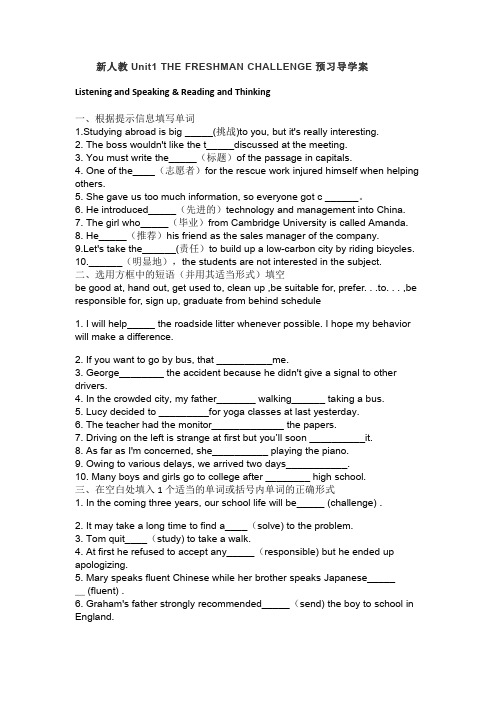
新人教Unit1THE FRESHMAN CHALLENGE预习导学案Listening and Speaking&Reading and Thinking一、根据提示信息填写单词1.Studying abroad is big_____(挑战)to you,but it's really interesting.2.The boss wouldn't like the t_____discussed at the meeting.3.You must write the_____(标题)of the passage in capitals.4.One of the____(志愿者)for the rescue work injured himself when helping others.5.She gave us too much information,so everyone got c______。
6.He introduced_____(先进的)technology and management into China.7.The girl who_____(毕业)from Cambridge University is called Amanda.8.He_____(推荐)his friend as the sales manager of the company.9.Let's take the______(责任)to build up a low-carbon city by riding bicycles.10.______(明显地),the students are not interested in the subject.二、选用方框中的短语(并用其适当形式)填空be good at,hand out,get used to,clean up,be suitable for,prefer...to...,be responsible for,sign up,graduate from behind schedule1.I will help_____the roadside litter whenever possible.I hope my behavior will make a difference.2.If you want to go by bus,that__________me.3.George________the accident because he didn't give a signal to other drivers.4.In the crowded city,my father_______walking______taking a bus.5.Lucy decided to_________for yoga classes at last yesterday.6.The teacher had the monitor_____________the papers.7.Driving on the left is strange at first but you’ll soon__________it.8.As far as I'm concerned,she__________playing the piano.9.Owing to various delays,we arrived two days___________.10.Many boys and girls go to college after________high school.三、在空白处填入1个适当的单词或括号内单词的正确形式1.In the coming three years,our school life will be_____(challenge).2.It may take a long time to find a____(solve)to the problem.3.Tom quit____(study)to take a walk.4.At first he refused to accept any_____(responsible)but he ended up apologizing.5.Mary speaks fluent Chinese while her brother speaks Japanese______(fluent).6.Graham's father strongly recommended_____(send)the boy to school in England.7.______(obvious),she is very clever because she can work out such a difficult problem.8.Having shown you around our school,we will introduce our most_____(advance)science lab to you.9.What the teacher said was so_____(confuse)that the students could hardly understand it.10._(actual),Mr.Black is an honest and reliable person,whom you can depend on.四、根据汉语提示完成句子1.Our teacher_____________________________The Wandering Earth.我们的老师推荐我们看《流浪地球》这部电影。
高一英语英语必修三Unit1导学案及练习题

高一英语英语必修三Unit1导学案及练习题本资料为woRD文档,请点击下载地址下载全文下载地址www.5ykj.com 第1课时Talkaboutfestivals:sometraditionalchineseFestivalsSpringFestival春节QingmingFestival清明节DoubleNinthFestival重阳节DoubleSeventhFestival七夕节mid-AutumnFestival中秋节LanternFestival元宵节(TheyuanxiaoFestival)DragonBoatFestival端午节*Festivalsaremeanttocelebrateimportantevents.*what’syourfavoriteholidayoftheyear?*whatfestivalsorcelebrationsdoyouenjoyinyourcityortown?*Doyoulikespendingfestivalswithyourfamilyorwithyour friends?*whatpartofafestivaldoyoulikebest——themusic,thethingstosee,thevisitorthefood?*Festivalsandcelebrationsofallkindsareheldeverywher e.*Theylitfiresandmademusicbecausetheythoughtthesefes tivalswouldbringayearofplenty.*Somefestivalsareheldtohonorthedeadorsatisfyandplea setheancestors.*Festivalscanbeheldasanhonortofamouspeopleorthegods.*Themostenergeticandimportantfestivalsaretheonestha tlookforwardtotheendofwinterandtothecomingofspring.*Festivalsletusenjoylife,beproudofourcustomsandforg etourdailylifeforalittlewhile.第2课时【自主学习】单词预习学案.庆典,庆祝n._________v.__________庆祝严寒的结束__________________________,________________2.起源,由来n._________HermotherisFrench__________宗教n._________adj._______宗教信仰__________3.到达n.________v._____________幸存,生还n._____________v.____________4.独立n.____________adj.___________从英国人那儿获得独立______________5.盼望春节的到来______________________________Specialattentionshouldbepaidto__________thewords.6.与家人玩得开心_________取笑某人,拿某人开玩笑___________Ididit_____________搞某人的恶作剧____________7.必要性,需要;必需品n._____必需的adj._______生活必需品______8.守信用,履行诺言_____________________食言____________9.道歉v.__________n.___________因某事向某人道歉__________Pleaseacceptmy______________forthatmeto___________tothatfellow?Noway!He_________________forsteppingonmyfoot.0.淹没,溺死v.__________pt___________pp____________adrowningman_____________adrownedbody_____________drownoneselfinwork__________drownone’ssadnessinwine__________1.哭泣,流泪v._____________pt___________pp_________He______________hisfailure.扫v._________________pt._____________pp._________________【合作探究】2.用dress,clothes,clothing,cloth适当形式填空)The________needwashing,canyouhave_______washed?2)Theshopsellschildren’s___________only.3)Pleasecoverthetablewitha___________.4)____________________________5)Peopleareexpectedtowearformal__________inawedding.3.inmemoryof;incelebrationof;inhonourof;intheshapeo f,insearchof填空)Theboyswent_________________somethingtoeat.2)Hewroteapoem_________________hiswife.3).manypeoplejoinedthem______________4).Peopleeatfood_________skullsonfestivalofthedead.5)Aceremonywasheld_______________thosekilledintheea rthquake【当堂检测】)Thegreatflood_________________________manyvill ages.那次大洪水把许多村子都淹没了。
2020学年人教版高中英语必修三Unit1知识点归纳总结
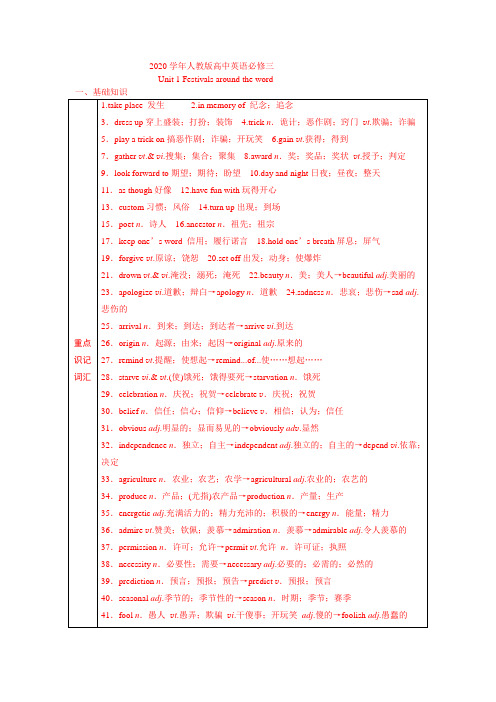
2020学年人教版高中英语必修三Unit 1 Festivals around the word二、重点单词突破1 satisfy v.使满意,使满足;满足(需求、需要等)[应试指导]写作高分句式:What satisfied sb.is that...替换to one’s satisfaction他对赢得比赛感到满意。
[夯实基础](1)用satisfy的适当形式填空①None of these is particularly satisfying.②We are not satisfied with these results.③Both sides expressed satisfaction with the progress so far.④We just can’t find enough good second-hand cars to satisfy demands.⑤From his satisfied voice on the phone I know everything is going under way.(2)The teacher was satisfied with his test results and praised him.Satisfied with his test results,the teacher praised him.(用过去分词作状语改写句子)2dress v.给……穿衣;穿着;打扮;n.衣裙;女装;衣服[应试指导]过去分词作定语、状语的考查休穿戴整洁地上班去了。
The boys were all dressed up as pirates.这些男孩子都装扮成了海盗。
[词义辨析]wear,have on,dress,put on(1)wear和have on表示“穿着”的状态,wear同时表示“佩戴”,并可以用于进行时,后还可以跟表示颜色的名词,而have on不行。
最新人教版高中英语必修三导学案(全册_共5个单元_35页)
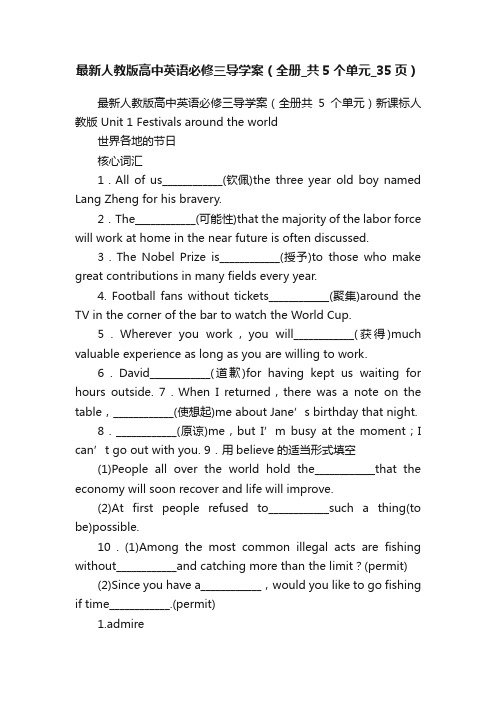
最新人教版高中英语必修三导学案(全册_共5个单元_35页)最新人教版高中英语必修三导学案(全册共5个单元)新课标人教版 Unit 1 Festivals around the world世界各地的节日核心词汇1.All of us____________(钦佩)the three year old boy named Lang Zheng for his bravery.2.The____________(可能性)that the majority of the labor force will work at home in the near future is often discussed.3.The Nobel Prize is____________(授予)to those who make great contributions in many fields every year.4. Football fans without tickets____________(聚集)around the TV in the corner of the bar to watch the World Cup.5.Wherever you work,you will____________(获得)much valuable experience as long as you are willing to work.6.David____________(道歉)for having kept us waiting for hours outside. 7.When I returned,there was a note on the table,____________(使想起)me about Jane’s birthday that night.8.____________(原谅)me,but I’m busy at the moment;I can’t go out with you. 9.用believe的适当形式填空(1)People all over the world hold the____________that the economy will soon recover and life will improve.(2)At first people refused to____________such a thing(to be)possible.10.(1)Among the most common illegal acts are fishing without____________and catching more than the limit?(permit)(2)Since you have a____________,would you like to go fishing if time____________.(permit)1.admire2.possibility3.awarded4.gathered5.gain6.apologized7.reminding8.Forgive9.(1)beliefssion (2)believe10.(1)permission (2)permit;permits高频短语1.________________ 发生2.________________ 纪念;追念3.________________ 盛装;打扮;装饰4.________________ 搞恶作剧;诈骗;开玩笑5.________________ 期望;期待;盼望6.________________ 日夜;昼夜;整天7.________________ 好像8.________________ 玩得开心9.________________ 出现;到场10.________________ 守信用;履行诺言11.________________ 屏息;屏气12.________________ 出发;动身;使爆炸13.________________ 使……想起……1.take place 2.in memory of 3.dress up 4.play a trick on 5.look forward to 6.day and night 7.as though 8.have fun with 9.turn up 10.keep one’s word 11.hold one’s breath 12.set off 13.remind...of...重点句式1.At that time people would starve if food____________,especially during the cold winter months.在当时,如果食物难以找到,人们就会挨饿,特别是在寒冷的冬季。
人教版高中英语必修三unit1教案
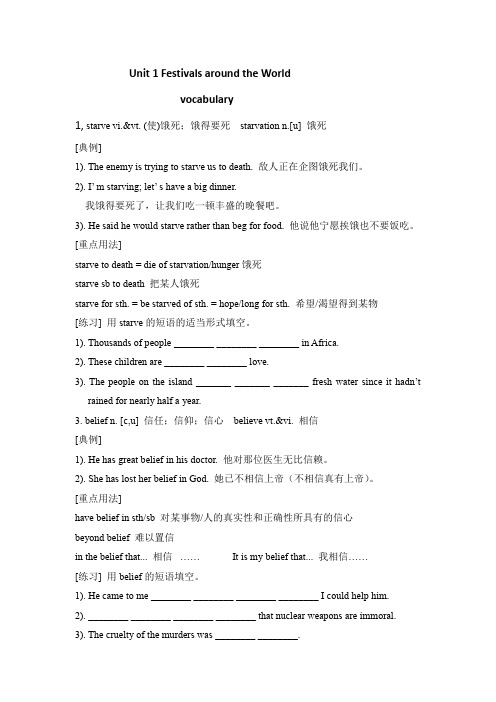
Unit1Festivals around the Worldvocabulary1,starve vi.&vt. (使)饿死;饿得要死starvation n.[u] 饿死[典例]1). The enemy is trying to starve us to death. 敌人正在企图饿死我们。
2). I’ m starving; let’ s have a big dinner.我饿得要死了,让我们吃一顿丰盛的晚餐吧。
3). He said he would starve rather than beg for food. 他说他宁愿挨饿也不要饭吃。
[重点用法]starve to death = die of starvation/hunger饿死starve sb to death 把某人饿死starve for sth. = be starved of sth. = hope/long for sth. 希望/渴望得到某物[练习] 用starve的短语的适当形式填空。
1). Thousands of people ________ ________ ________ in Africa.2). These children are ________ ________ love.3). The people on the island _______ _______ _______ fresh water since it hadn’trained for nearly half a year.3. belief n. [c,u] 信任;信仰;信心believe vt.&vi. 相信[典例]1). He has great belief in his doctor. 他对那位医生无比信赖。
2). She has lost her belief in God. 她已不相信上帝(不相信真有上帝)。
(完整版)高中英语必修三Unit1单词(人教版)
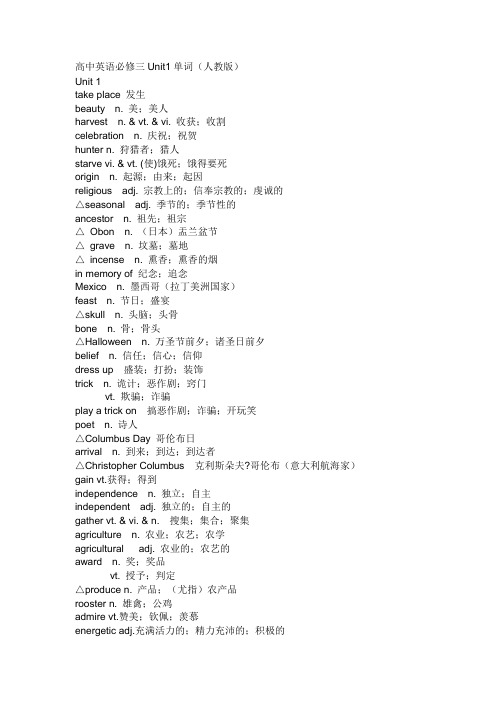
高中英语必修三Unit1单词(人教版)Unit 1take place 发生beauty n. 美;美人harvest n. & vt. & vi. 收获;收割celebration n. 庆祝;祝贺hunter n. 狩猎者;猎人starve vi. & vt. (使)饿死;饿得要死origin n. 起源;由来;起因religious adj. 宗教上的;信奉宗教的;虔诚的△seasonal adj. 季节的;季节性的ancestor n. 祖先;祖宗△Obon n. (日本)盂兰盆节△grave n. 坟墓;墓地△incense n. 熏香;熏香的烟in memory of 纪念;追念Mexico n. 墨西哥(拉丁美洲国家)feast n. 节日;盛宴△skull n. 头脑;头骨bone n. 骨;骨头△Halloween n. 万圣节前夕;诸圣日前夕belief n. 信任;信心;信仰dress up 盛装;打扮;装饰trick n. 诡计;恶作剧;窍门vt. 欺骗;诈骗play a trick on 搞恶作剧;诈骗;开玩笑poet n. 诗人△Columbus Day 哥伦布日arrival n. 到来;到达;到达者△Christopher Columbus 克利斯朵夫?哥伦布(意大利航海家)gain vt.获得;得到independence n. 独立;自主independent adj. 独立的;自主的gather vt. & vi. & n. 搜集;集合;聚集agriculture n. 农业;农艺;农学agricultural adj. 农业的;农艺的award n. 奖;奖品vt. 授予;判定△produce n. 产品;(尤指)农产品rooster n. 雄禽;公鸡admire vt.赞美;钦佩;羡慕energetic adj.充满活力的;精力充沛的;积极的look forward to 期望;期待;盼望△carnival n. 狂欢节;(四旬斋前的)饮宴狂欢;嘉年华(会)△lunar adj. 月的;月亮的;阴历的Easter n. (耶稣)复活节△parade n. 游行;阅兵;检阅day and night 日夜;昼夜;整天clothing n. 衣服Christian n. 基督徒;信徒adj. 基督教的;信基督教的△Jesus n. 耶稣△cherry n. 樱桃;樱桃树△blossom n. 花vt. 开花as though 好像have fun with 玩得开心custom 习惯;风俗worldwide adj. 遍及全世界的;世界性的△rosebud n. 玫瑰花蕾fool n. 愚人;白痴;受骗者vt. 干傻事;开玩笑adj. 傻的△necessity n. 必要性;需要permission n. 许可;允许△prediction n. 预言;预报;预告△fashion n. 样子;方式;时尚△Trinidad n. 特立尼达岛△Carla n. 卡拉(女名)△Hari n. 哈利(男名)parking n. (汽车等)停放parking lot 停车场△Valentine’s Day n. 圣瓦伦廷节;情人节turn up 出现;到场keep o ne’s word 守信用;履行诺言hold one’s breath 屏息;屏气apologize vi. 道歉;辩白drown vt. & vi. 淹没;溺死;淹死sadness n. 悲哀,悲伤obvious adj. 明显的;显而易见的wipe vt. 擦;揩;擦去△weave vt. & vi. (wove, woven)(使)迂回△herd n. 牧群;兽群△the Milky Way 银河△magpie n. 喜鹊weep vi. (wept, wept) 哭泣;流泪n. 哭;哭泣△announcer n. 广播员;告知者;报幕员set off 出发;动身;使爆炸remind vt. 提醒;使想起remind … of … 使……想起……forgive vt. (forgave, forgiven) 原谅;饶恕。
人教版高一英语必修三导学案 全册
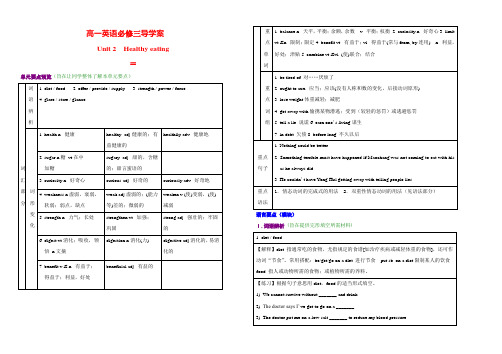
高一英语必修三导学案Unit 2 Healthy eating=单元要点预览(旨在让同学整体了解本单元要点)语言要点(模块)Ⅰ.词语辨析(旨在提供完形填空所需材料)Ⅱ.词形变化(旨在提供语法填空所需材料)Ⅲ.重点词汇(旨在提供词汇综合运用材料)1. balance n. 天平,平衡;余额,余数v. 平衡;权衡balanced adj. 均衡的[典例] 1). Try to achieve a better balance between work and play. 争取把工作和娱乐更好地结合起来。
2). I must check my bank balance (= find out how much money I have in my account).我要核对一下我在银行的余额(看我的帐户上有多少钱)。
3). Try to balance your diet by eating more fruit and less protein. 多吃些水果, 少摄入些蛋白质, 使饮食均衡合理。
[重点用法] a balanced diet 均衡的饮食keep the balance of nature保持生态平衡keep one’ s balance保持平衡lose one’ s balance (= be out of balance) 失去平衡[练习] 用balance短语填空或翻译。
1). He ______ ______ ______ and hurt himself when he went upstairs.2). It is difficult to for you to ______ ______ _______ on an icy pavement.3). 我们必须权衡利弊才做出决定。
____________________________________2. curiosity n. 好奇心curious adj. 好奇的curiously adv. 好奇地[典例] 1). Children have a natural curiosity about the world around them.小孩子对他们周围的世界有着天生的好奇心。
2020学年人教版高中英语必修三unit1知识点总结
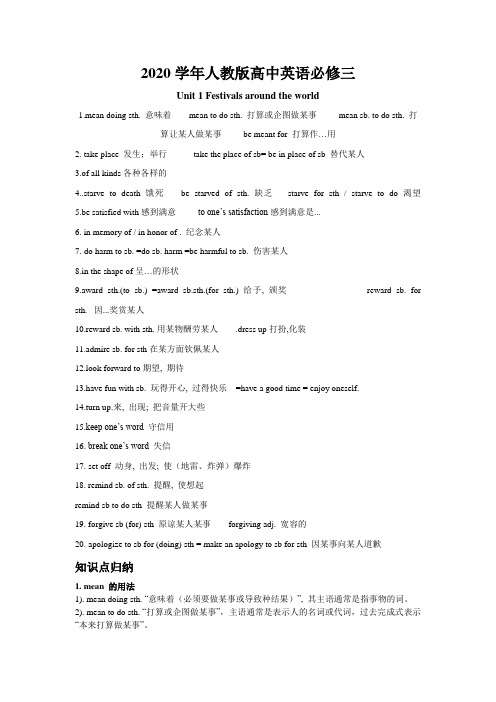
2020学年人教版高中英语必修三Unit 1 Festivals around the world1.mean doing sth. 意味着mean to do sth. 打算或企图做某事mean sb. to do sth. 打算让某人做某事be meant for 打算作…用2. take place 发生;举行take the place of sb= be in place of sb 替代某人3.of all kinds 各种各样的4..starve to death饿死be starved of sth. 缺乏starve for sth / starve to do 渴望5.be satisfied with感到满意to one’s satisfaction感到满意是...6. in memory of / in honor of . 纪念某人7.do harm to sb. =do sb. harm =be harmful to sb. 伤害某人8.in the shape of呈…的形状9.award sth.(to sb.) =award sb.sth.(for sth.) 给予, 颁奖reward sb. for sth. 因...奖赏某人10.reward sb. with sth. 用某物酬劳某人.dress up打扮,化装11.admire sb. for sth在某方面钦佩某人12.look forward to期望, 期待13.have fun with sb. 玩得开心, 过得快乐=have a good time = enjoy oneself.14.turn up.来, 出现; 把音量开大些15.keep one’s word 守信用16. break one’s word 失信17.set off 动身, 出发; 使(地雷、炸弹)爆炸18. remind sb. of sth. 提醒, 使想起remind sb to do sth 提醒某人做某事19. forgive sb (for) sth 原谅某人某事forgiving adj. 宽容的20.apologize to sb for (doing) sth = make an apology to sb for sth 因某事向某人道歉知识点归纳1. mean 的用法1). mean doing sth. “意味着(必须要做某事或导致种结果)”, 其主语通常是指事物的词。
Unit1 Vocabulary(教案(人教版必修三)

(高一)年级(英语)学科教学案授课班级:____ 姓名________ 课时__1-2____ 日期______设计者:高一年级组课题名称:_模块三Unit1 Festivals around the world(Vocabulary)教师寄语:No pains, no gains. 没有付出,没有收获.【自研课导学】自研内容及目标:1、鼓励学生自己先试着掌握新词汇读法,然后小组同学之间进行纠音;最后巩固词汇记忆2、在自学的过程中,若遇到自己不会读的单词,请做上记号。
课型设置:【自研·互动+ 展示】【展示课导学】(一)学习目标:通过本单元学习:1.能够使学生对本单元词汇形成正确的读音。
2.能够使学生对本单元重点词汇进行记忆与理解,并学会在练习中加以正确应用。
词汇讲评:1、celebration (n.) / celebrate (v.)/ celebrated (adj.)著名的/ celebrity (n) 名人;名声[辨析] celebrate / congratulatecelebrate sth. 庆祝某事have/ hold a celebration 举行庆祝会in celebration of 为了庆祝congratulate sb. on (doing) sth.祝贺某人做某事/ congratulations to sb. on (doing) sth.E.g. We celebrated New Year with a party.We congratulated him on having passed the examination.2、hunter / hunt / huntinghunt for = look for = in search of = search for3、starve / starvation / starvingstarve to death = be starved to death =die of starvation/hunger饿死starve for sth. = be starved of sth. = be dying for sth. = be eager for sth. =be anxious for = long for = be in great need of 渴望/迫切需要某物。
2020学年人教版高中英语必修三Unit1重难点知识归纳总结
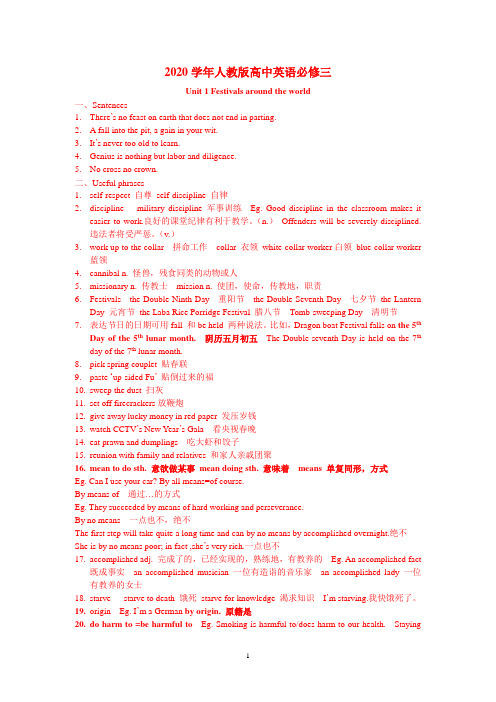
2020学年人教版高中英语必修三Unit 1 Festivals around the world一、Sentences1.There’s no feast on earth that does not end in parting.2. A fall into the pit, a gain in your wit.3.It’s never too old to learn.4.Genius is nothing but labor and diligence.5.No cross no crown.二、Useful phrases1.self-respect 自尊self-discipline 自律2.discipline military discipline 军事训练Eg. Good discipline in the classroom makes iteasier to work.良好的课堂纪律有利于教学。
(n.)Offenders will be severely disciplined.违法者将受严惩。
(v.)3.work up to the collar 拼命工作collar 衣领white-collar worker白领blue-collar worker蓝领4.cannibal n. 怪兽,残食同类的动物或人5.missionary n. 传教士mission n. 使团,使命,传教地,职责6.Festivals the Double-Ninth Day 重阳节the Double-Seventh Day 七夕节the LanternDay 元宵节the Laba Rice Porridge Festival 腊八节Tomb-sweeping Day 清明节7.表达节日的日期可用fall 和be held 两种说法。
比如,Dragon boat Festival falls on the 5thDay of the 5th lunar month. 阴历五月初五The Double-seventh Day is held on the 7th day of the 7th lunar month.8.pick spring couplet 贴春联9.paste ‘up-sided Fu’贴倒过来的福10.sweep the dust 扫灰11.set off firecrackers放鞭炮12.give away lucky money in red paper 发压岁钱13.watch CCTV’s New Year’s Gala 看央视春晚14.eat prawn and dumplings 吃大虾和饺子15.reunion with family and relatives 和家人亲戚团聚16.mean to do sth. 意欲做某事mean doing sth. 意味着means 单复同形,方式Eg. Can I use your car? By all means=of course.By means of 通过…的方式Eg. They succeeded by means of hard working and perseverance.By no means 一点也不,绝不The first step will take quite a long time and can by no means by accomplished overnight.绝不She is by no means poor; in fact ,she’s very rich.一点也不17.accomplished adj. 完成了的,已经实现的,熟练地,有教养的Eg. An accomplished fact既成事实an accomplished musician 一位有造诣的音乐家an accomplished lady 一位有教养的女士18.starve starve to death 饿死starve for knowledge 渴求知识I’m starving.我快饿死了。
人教版高中英语必修第3册 Unit 1 Reading for Writing导学案

3.学习准备:
准备好必修三课本和笔记本。
4.学习方式和环节:
按老师指令完成相应的课上练习,学习环节主要有:
了解学习目标,进入文本阅读。第一遍阅读,回答两个概括性பைடு நூலகம்问题 第二遍阅读回答两个开放性问题 第三遍阅读,分析文章的结构和语言特点应用三种句型改写句子 根据表格梳理自己文章的内容和结构,进而进行写作练习 根据评价表自行修改自己的文章 阅读例文,借鉴其中好的内容和语言,再次修改自己的文章
导学案
1.课题名称:
人教版高一必修三英语——Unit1 Reading for writing
2.学习目标:
In this class, you will:
1. Acquire the information about Naadam Festival
2. Analyze the organization and language features of the diary
2020学年人教版高中英语必修三Unit1词汇语法导学案
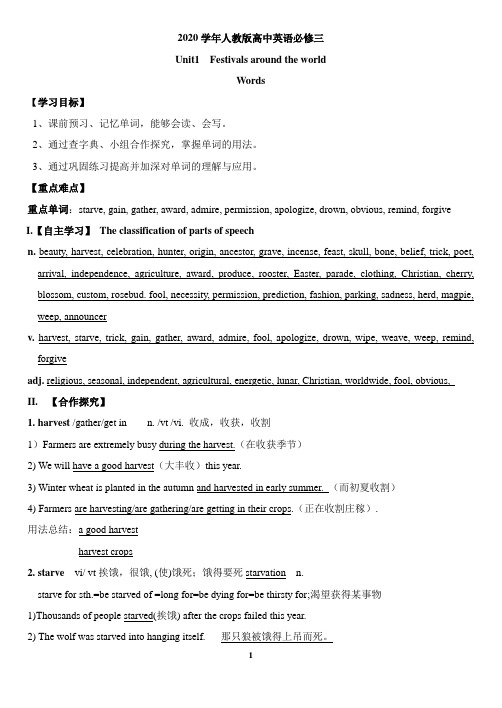
2020学年人教版高中英语必修三Unit1 Festivals around the worldWords【学习目标】1、课前预习、记忆单词,能够会读、会写。
2、通过查字典、小组合作探究,掌握单词的用法。
3、通过巩固练习提高并加深对单词的理解与应用。
【重点难点】重点单词:starve, gain, gather, award, admire, permission, apologize, drown, obvious, remind, forgiveI.【自主学习】The classification of parts of speechn. beauty, harvest, celebration, hunter, origin, ancestor, grave, incense, feast, skull, bone, belief, trick, poet, arrival, independence, agriculture, award, produce, rooster, Easter, parade, clothing, Christian, cherry, blossom, custom, rosebud. fool, necessity, permission, prediction, fashion, parking, sadness, herd, magpie, weep, announcerv.harvest, starve, trick, gain, gather, award, admire, fool, apologize, drown, wipe, weave, weep, remind, forgiveadj. religious, seasonal, independent, agricultural, energetic, lunar, Christian, worldwide, fool, obvious,II. 【合作探究】1. harvest /gather/get in n. /vt /vi. 收成,收获,收割1)Farmers are extremely busy during the harvest.(在收获季节)2) We will have a good harvest(大丰收)this year.3) Winter wheat is planted in the autumn and harvested in early summer. (而初夏收割)4) Farmers are harvesting/are gathering/are getting in their crops.(正在收割庄稼).用法总结:a good harvestharvest crops2. starve vi/ vt挨饿,很饿, (使)饿死;饿得要死starvation n.starve for sth.=be starved of =long for=be dying for=be thirsty for;渴望获得某事物1)Thousands of people starved(挨饿) after the crops failed this year.2) The wolf was starved into hanging itself.那只狼被饿得上吊而死。
- 1、下载文档前请自行甄别文档内容的完整性,平台不提供额外的编辑、内容补充、找答案等附加服务。
- 2、"仅部分预览"的文档,不可在线预览部分如存在完整性等问题,可反馈申请退款(可完整预览的文档不适用该条件!)。
- 3、如文档侵犯您的权益,请联系客服反馈,我们会尽快为您处理(人工客服工作时间:9:00-18:30)。
2020学年人教版高中英语必修三Unit1 Festivals around the worldNew words and expressions编写人: 审核:全体英语组编写时间:【学习目标】学习本单元重点单词、短语【学习重点】学习近义词比较以及短语辨析【学习难点】如何区别近义词以及同类短语【学法指导】①仔细研读所给信息②例句仿写注意根据例子临摹Learing Procedures:1. gain vt.&vi. 获得;得到;增加n.利益;收益【观察思考】①I gain a lot from\by my former experience. 我从以前的经验中学到了很多东西。
②He has gained weight and looked much better. 他胖了,脸色也好看多了。
③No pains, no gains. 翻译:【归纳总结】①从………中受益(例1)② \strength\ \ability增加体重\力量\经验\能力 (例2)2. admire vt. 赞美;钦佩;羡慕;欣赏【观察思考】①We stopped halfway up the hill to admire the view.我们停在半山腰欣赏风景。
此句中admire的意思是。
②I admire him for his success in business.我很羡慕他生意这么成功。
此句中admire的意思是。
【归纳总结】admire sb. for (doing) sth.【活学活用】I full marks in the exam. (gain)我羡慕他考试得了满分。
3. award vt. 授予;判给;n.奖励;奖品;奖金【观察思考】①The judge awarded him a large amount of money as damages.法官判给他一大笔钱作为损失费。
此句中award的意思是。
②He was awarded the gold medal for being the fastest runner this year.他跑得最快,因而获得了金牌。
此句中award的意思是。
③She showed us the awards she had won.她给我们看她赢得的奖品。
此句中award的意思是。
【单词辨析】award 与reward的区别【活学活用】award\reward①How can I your kindness?我如何才能报答你的好意呢?②She offered a of $2,000 for information about her missing son.她悬赏2000美元,寻找失踪儿子的下落。
③Edinburgh was the title of World’s First City of Literature.爱丁堡被授予“世界首座文学之城”的称号。
4. permission U.允许;许可【观察思考】①You must ask for my permission if you want to enter my bedroom.如果你想进入我的房间必须经过我的允许。
②Nobody can get into the room without permission .没有我的允许,任何人不得进入这个房间。
【归纳总结】由以上两个例子总结两个短语:征得某人的允许未经允许\许可【思维拓展】permission n.vt.&vi允许5. take place 发生;举行注意:take place为不及物动词短语【活学活用1】Great changes in our school in the past few years.在过去几年里我们学校发生了巨大的变化。
比较take place\happen\break out【观察思考】①The evening party will take place on Sunday. 晚会定于星期日举行。
②The hand-foot-mouth disease broke out in some places. 一些地方爆发了手足口病。
③A terrible accident happened near our school mid-night.半夜在我们学校附近发生了一个可怕的事故。
【自我探究】①指举行、举办,即这种事件的发生一定有某种原因或事先安排;②指发生、碰巧做,一般用于偶然或突发性的事件;③指发生、爆发,常指战争、灾难、疾病或争吵等事件发生。
6. in memory of 作为对某人的纪念;纪念某人【思维拓展】用于in+n.+of结构的还有以下一些短语:①in of 为向……表示敬意②in of 为寻找………③in of 代替………. ④in of 掌管…….. 【活学活用】用以上短语填空。
①The library built last year was the great scietists.去年建的这个图书馆是为了纪念这位伟大的科学家。
②A great many college graduates went to the big cities better jobs.许多大学毕业生去大城市寻找好工作。
③The boy replaced his father their business.这个男孩取代他的父亲掌管他们的生意。
7. look forward to 期望;期待;盼望【观察思考】①People look forward to the end of winter and to the coming of spring.人们都盼望这冬天的结束和春天的到来。
②She has been looking forward to having a chance to pay a visit to Taiwan.她一直盼望能有机会去台湾观光。
【归纳总结】由以上两个例子可以看出的意思是“盼望、渴望”。
其中to为介词。
后面只能接、代词或。
【思维拓展】完成以下“to”为介词的短语:①to导致;引起②to对……重视③to把……致力于……④to注意……【活学活用】①She has been a pop star since childhood.自从孩童以来她一直盼望着变成一个明星。
(become)②The scientist protecting wildlife.这个科学家一生致力于保护野生动植物。
③In China,most parents their children’s education.在中国,大多数父母都重视他们孩子的教育。
8. turn up 调高(音量、热量等);出现;露面【观察思考】He promised to come, but so far he hasn’t turned up yet.此句中turn up的意思是。
【思维拓展】有关turn的短语:①turn aroud 转身;回头②turn down 调低(音量、热量);拒绝某人③turn out(to be)…. 结果是;原来是④turn to sb. for help 向某人求助【活学活用】①He asked Jane to marry him but she him .他向简求婚,但她拒绝了他。
②Please when you are in trouble.当你处境困难时请向我求助。
③The gentleman a thief.这位绅士结果是一个小偷。
④Don’t worry about your dog.It’ll sooner or later.别担心你的狗了。
它迟早会出现的。
9. set off 出发;动身;使爆炸;;燃放(烟花、爆竹等)【观察思考】①All the family set off for Beijing to go for a holiday.此句中set off 的意思是,set off for………意思是“动身去……..”。
②Somebody was setting off fireworks down the street.此句中set off 的意思是。
【当堂检测】一、汉英互译。
1) vt&vi&n.收获;收割 2) origin n.3)celebration n. 4) n.祖先;祖宗5)n.风俗;习惯 6) adj.独立的;自立的7) vt.赞美;钦佩 8) enegetic adj.9) 盛装;打扮 10)have fun with11) 搞恶作剧;开玩笑 12) 日夜;整天二、用以上单词、短语完成下列句子。
1) During the busy season, farmers get up early and don’t stop workinguntil dusk.2) As you know, every country has its own .3) Not all scientists accept his new theory about the of the universe(宇宙).4) I have to him for the way he solved the problem.5) His came to America from Ireland.6) He said that they needed more players on their basketball team.7) On weekends I like to go to clubs and my good friends.9) I told them that it was wrong for them to the stranger(陌生人).10) We are working to complete the building ahead of time(提前).三、选择最佳选项。
1) Many of his ideas, which were not known to all at first, have popularsupport later.A. gainedB. ownedC. gatheredD. accepted※2) The old man was almost dying, terrified with darkness and loneliness. He really for love and care.A. lookedB. askedC.searchedD. starved3)——You look so upset. What’s the matter?——My suggestion was again.A. turned onB. turned outC.turned upD.turned down4)——Why was Mr. Li so happy this morning?——Because he was honoured with a(n) for excellence in teaching.A. presentB. giftC. awardD. reward四、根据所给提示,完成下列句子。
